 Your new post is loading...
 Your new post is loading...

|
Rescooped by
eMedToday
from Pharma Hub
December 21, 2015 1:42 AM
|
A new wave of wearable computing devices that detect and monitor serious diseases is moving from the laboratory to the market, potentially transforming the treatment of conditions ranging from epilepsy to diabetes and creating business opportunities estimated to be worth tens of billions of dollars.
Unlike popular fitness-tracking devices, such as Fitbit Inc's Fitbit and Jawbone's UP wristbands, these so-called medical-grade wearables require approval from the U.S. Food and Drug Administration - a rigorous regulatory hurdle that first-generation wearables sought to avoid.
The FDA is preparing for the coming onslaught.
Bakul Patel, FDA's associate director for digital health, told Reuters the agency is reviewing applications for three new senior health scientist positions focused on digital health.
Long criticized by some health-tech entrepreneurs as a barrier to innovation, the FDA is now seen as an important ally by companies eager to show that their devices can improve peoples' health - and eager to get heath insurers to cover them.
"Consumers, doctors, payers all want to know if a product provides a clinical benefit," said Julie Papanek of the venture capital firm Canaan Partners, who invests in wearables startups. "Working with the FDA is the one way to get the ability to market that benefit."
A key driver in the new wearables wave is the push for so-called value-based healthcare that is part of the Affordable Care Act. The law gives doctors and hospitals financial incentives for keeping large groups of patients healthy.
Under the old fee-for-service model, hospitals got paid when patients were hospitalized, noted Jody Ranck, a Washington, D.C.-based healthcare consultant. "Now, you can lose money," he said. Instead, healthcare providers are now eager to collect the data that can help keep people out of the hospital - especially those with chronic diseases. "These wearables are just tools to get the health data," said Ranck.
An avalanche of studies - many of them taking advantage of new data-gathering platforms such as Apple Inc's HealthKit, Google's Google Fit and Samsung's SAMI - are under way on a number of chronic diseases, especially in the area of diabetes. "We're going to see a lot of devices over the next couple of years for every chronic condition of mankind that are FDA-regulated because they all involve a treatment loop," Scripps' Topol said.
Via Pharma Guy, Philippe Marchal

|
Scooped by
eMedToday
December 17, 2015 1:51 AM
|
Growing demand for elderly e-health applications – the delivery of healthcare and services by electronic means – and m-health applications – the delivery of healthcare services via mobile communication devices such ...
A daily health checklist will be sent directly to participants' mobile phone. They will receive reminders about their daily health tasks and can track their progress, including medication adherence and physical activity.
Via Philippe Marchal, Lionel Reichardt / le Pharmageek

|
Scooped by
eMedToday
December 15, 2015 10:18 PM
|
(SPONSORED) As patients increase their usage of mhealth products and services, some providers are working to create effective solutions and programs utilizing this technology to reduce costs, enhance care management and improve outcomes.

|
Scooped by
eMedToday
December 14, 2015 5:59 AM
|
Mobile security is a major topic of conversation when implementing BYOD strategies.

|
Scooped by
eMedToday
December 13, 2015 5:08 AM
|
A new study released by mobile engagement provider Mobiquityexposes the “gap between patients’ demand for taking control of their own health and the accessibility or availability of digital and mobile tools when it comes to the management of chronic health conditions.” The study revealed that o...

|
Scooped by
eMedToday
December 13, 2015 5:05 AM
|
Mobile health or mHealth technology is giving nurses the ability to improve care and communication and educate patients in managing their own health.

|
Scooped by
eMedToday
December 13, 2015 4:59 AM
|
Smartphone users seem to have a high regard for mobile health apps, especially those focused on providing diet and fitness support.

|
Scooped by
eMedToday
December 11, 2015 2:25 AM
|
Of the roughly 40,000 health apps available for smartphone, there are about 800 apps oriented around mental health care. So, if the key to effective therapy, as most professionals argue, is human interaction, can apps provide any benefit at all?

|
Rescooped by
eMedToday
from #eHealthPromotion, #SaluteSocial
December 11, 2015 2:06 AM
|
If you’re tired of wearable fitness trackers fighting for space on your wrist, it might not be a problem in the near future: researchers say they can reliably measure your heart and breathing rates just by looking at data from a smartphone sitting in your pocket or bag.
Researchers at MIT are working on a project called BioPhone that derives these biological signals from your smartphone’s accelerometer, which they say can capture the small movements of your body that result from the beating of your heart and rising and falling of your chest. A paper on the work was presented at a conference in August.
Via Alex Butler, Giuseppe Fattori

|
Scooped by
eMedToday
November 30, 2015 2:51 AM
|
mobile health apps are becoming increasingly popular among consumers and the developers of those applications are going to need to start placing a larger

|
Rescooped by
eMedToday
from #eHealthPromotion, #SaluteSocial
November 30, 2015 2:33 AM
|
Rock Health identified six different categories of digital health use: searching for online health information, comparing health services online, tracking health with a mobile app, tracking health with a wearable device, using telemedicine, and using consumer-facing genetic services. Twenty percent hadn’t adopted technology in any of the categories, while 2 percent were “super adopters” using all categories or all but one. To look at the trend of consumer health engagement another way, more than half of the 4,000 internet-connected adults surveyed said they felt responsible for their own health — though that responsibility only seemed to extend so far. “While 52 percent of consumers strongly agree they are responsible for their own health, only 7 percent would say the same about their willingness to pay out-of-pocket for healthcare,” report authors Malay Gandhi and Teresa Wang wrote, noting that 31 percent say they are “actively taking care of their health.”
Via Giuseppe Fattori

|
Rescooped by
eMedToday
from #eHealthPromotion, #SaluteSocial
November 20, 2015 1:27 AM
|
A doctor friend once told me the best thing I could do for my health was to turn off my cellphone. But that was before smartphone makers began building health and safety features into their phones. Here are five healthful tricks your phone can do. Medical ID: Apple’s Medical ID turns any iPhone 4s or newer model into a mobile medical alert bracelet. Tap on your phone’s Health app icon (it’s the white square with a red heart) to find it. Setting up your phone’s medical ID allows doctors or emergency workers to tap and hold the Emergency button on your home screen — even when it’s locked — to access medical conditions, allergies, emergency contacts, blood type and other potentially lifesaving information. (Make sure you enable the “show when locked” switch.)
Via Giuseppe Fattori
|

|
Rescooped by
eMedToday
from #eHealthPromotion, #SaluteSocial
December 21, 2015 1:40 AM
|
Dr. Jessica Mega leads Google Life Sciences' ambitious quest to use Big Data to learn what it means to be healthy.
MOUNTAIN VIEW, Calif. — Dr. Jessica Mega, a star cardiologist at Harvard Medical School, swapped coasts early this year to become medical director of Google Life Sciences — the Silicon Valley giant’s new foray into health and medicine. Before taking a leave from Harvard, Mega led groundbreaking clinical trials that used genetic and molecular signals of disease to study customized treatments for heart patients. That put her in the sweet spot to lead the new firm’s ambitious quest to analyze genomic, molecular, and imaging big data from 10,000 volunteers to figure out what it means to be healthy — the so-called baseline study. Google Life Sciences — spun off when Google recently reinvented itself as Alphabet, a holding company for Google itself and affiliated entities — has generated buzz in the medical community. Its experts try to turn blue-sky ideas into products by cross-pollinating medicine, engineering, and data science. Read more: Geneticist Craig Venter helped sequence the human genome. Now he wants yours They’ve already produced a contact lens for diabetics that continuously monitors glucose in tears. Another prototype “paints” nanoparticles with substances that detect cancer or other abnormalities. As the particles flow through the body, a wrist band — think Fitbit’s smarter sibling — peers into blood vessels to read their findings. Mega recently sat down with STAT at Google’s offices to talk about the baseline study. The conversation that follows has been edited and condensed.
Via Giuseppe Fattori

|
Scooped by
eMedToday
December 17, 2015 1:50 AM
|
How AppInventiv�s mHealth services facilitating thousands of patients and doctors through its technology-based applications.

|
Scooped by
eMedToday
December 15, 2015 10:19 PM
|
Are mobile health apps truly capable of improving patient engagement across the healthcare continuum?

|
Scooped by
eMedToday
December 14, 2015 6:01 AM
|
Hispanics are pioneers in mobile health adoption and will become primary care’s consumer mavericks, according to a new report from PwC's Health Research Institute (HRI).

|
Scooped by
eMedToday
December 13, 2015 5:10 AM
|
Cello Health Insight published a report summarising findings from research conducted with doctors across 8 markets; including the UK, France, Germany, Italy, Spain, the US, China and Brazil. The research explores ways in which doctors are interacting with digital communication channels and digital devices in the workplace – focusing specifically on how doctors are using these to exchange information and communicate with peers, pharmaceutical sales representatives and patients.Key FindingsFace-to-face communication still biggest influence on doctors’ prescribing behaviour. Digital technology is bringing healthcare professionals and patients closer together, but face-to-face information from peers, KOLs and pharmaceutical sales representatives remain the biggest influencers on prescribing behaviour.Patients’ online diagnosis leading to requests for specific drugs. According to their doctors, patients are getting involved in their treatment decisions through self-diagnosis online. 69% of doctors surveyed agreed that many of their patients often look up their condition online prior to a consultation.62% of doctors say that patients often came to them with a diagnosis that they wanted to discuss (having researched online). 40% of doctors surveyed said that their patients often specifically ask for a named prescription having diagnosed themselves online.Doctors reluctant to recommend apps and wearables to patients, yet. Despite 41% of doctors surveyed agreeing that health apps could be a ‘game changer’, globally just 36% said they are likely to recommend such an app to their patients in future. Currently, the main reasons for recommending mobile health apps are: Diet and Weight Loss (70%), General health and fitness activity (65%), Health Monitoring (53%), Smoking Cessation (49%), and Compliance (45%).36% of doctors surveyed say they are likely to recommend wearable technology to patients in the future, although there are significant geographical variations in this figure (US 43%, UK 33%, highest in Brazil 67%). The main barrier to recommendation of wearable tech and health apps was a concern that not all patients have smartphones (28%), followed by possible inconsistent use of the app leading to incomplete data (14%), perceived issues in integrating with existing health electronic management systems (11%) and doctors not having the time or necessary skills to make use of the data (10%). | #eHealthPromotion, #web2salute

|
Scooped by
eMedToday
December 13, 2015 5:07 AM
|
Here’s how to connect with improved health.

|
Scooped by
eMedToday
December 13, 2015 5:03 AM
|
Mobile health apps and devices have made significant strides in advancing the quality of healthcare services and patient outcomes around the country.

|
Scooped by
eMedToday
December 13, 2015 4:57 AM
|
Consumers want health apps to do more for their lives, to

|
Rescooped by
eMedToday
from #eHealthPromotion, #SaluteSocial
December 11, 2015 2:06 AM
|
A global survey focusing on mobile health apps shows the majority of those companies and developers who produce them are dissatisfied with the reception their apps receive on the market, and say performance falls short of their goals. The report by German market research company research2guidance also indicated a changing profile of the developers and businesses behind these apps, along with their priorities.The survey also sought to explore some of the distinguishing characteristics of successful mobile health app
Via Alex Butler, Giuseppe Fattori

|
Rescooped by
eMedToday
from #eHealthPromotion, #SaluteSocial
December 11, 2015 2:05 AM
|
Fitbit activity trackers come with a “manifesto.” Over a photo of a fierce-eyed jogger, the company’s website proclaims: “Every moment matters and every bit makes a big impact. Because fitness is the sum of your life.” Roughly 20 million people have found that message compelling enough to order a Fitbit. Many more seek out other devices and smartphone apps designed to count their steps, their calories, or their hours of sleep; to help them quit smoking, drinking, or stressing; or to help manage chronic illness. The distillation of daily life into a motivational stream of stats has become a booming industry—the world of the quantified self. This life-tracking craze has produced something that many clinical researchers covet: a deluge of intimate data about individuals’ moment-to-moment behavior in “the wild,” as researchers sometimes call the world outside the controlled environment of the lab or the clinic. “It’s sort of opening a window into parts of people’s lives we haven’t really had access to before,” says Ida Sim, a physician and informaticist at the University of California, San Francisco.
Via JP DOUMENG, Philippe Marchal, Giuseppe Fattori

|
Scooped by
eMedToday
November 30, 2015 2:50 AM
|
Over 165,000 mobile health (mHealth) apps are available to consumers but 36 apps account for about half of all downloads. About 40% of mHealth apps have been downloaded less than 5,000 times.

|
Rescooped by
eMedToday
from Digital marketing pharma
November 20, 2015 1:27 AM
|
Patients view physicians as more knowledgeable about digital health than physicians view themselves, according to a recent Ipsos survey of physicians, the general population, and people with diabetes in the UK and US. Ipsos’ survey included responses for 200 US providers, 200 UK providers, 4,185 US consumers, 2,503 UK consumers, 416 people with Type 2 diabetes in the US, and 257 people with Type 2 diabetes in the UK.
Via Olivier Delannoy
|



 Your new post is loading...
Your new post is loading...




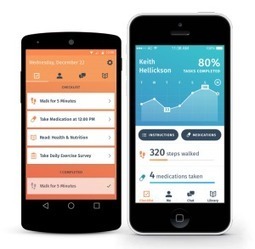
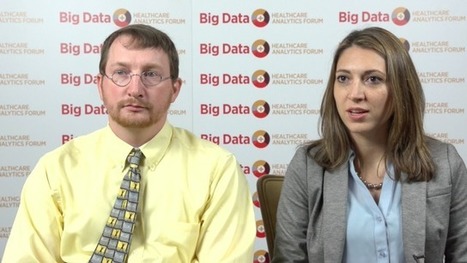






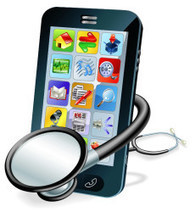








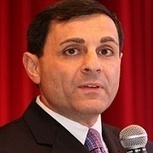



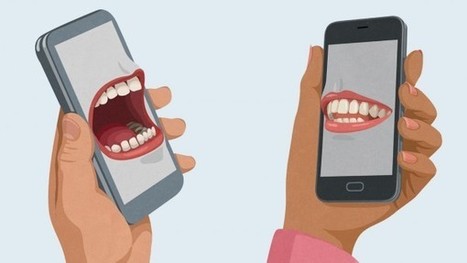

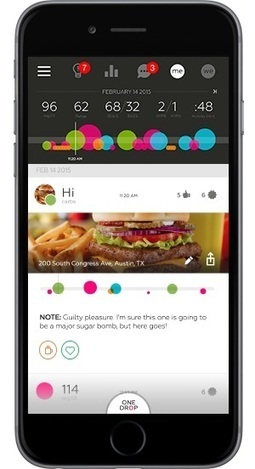





More than FDA approval is required. Download this presentation: "Mastering Mobile Social Media to Improve Health Outcomes"; http://sco.lt/8w7RTN